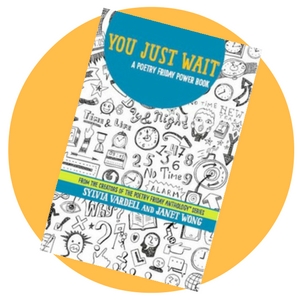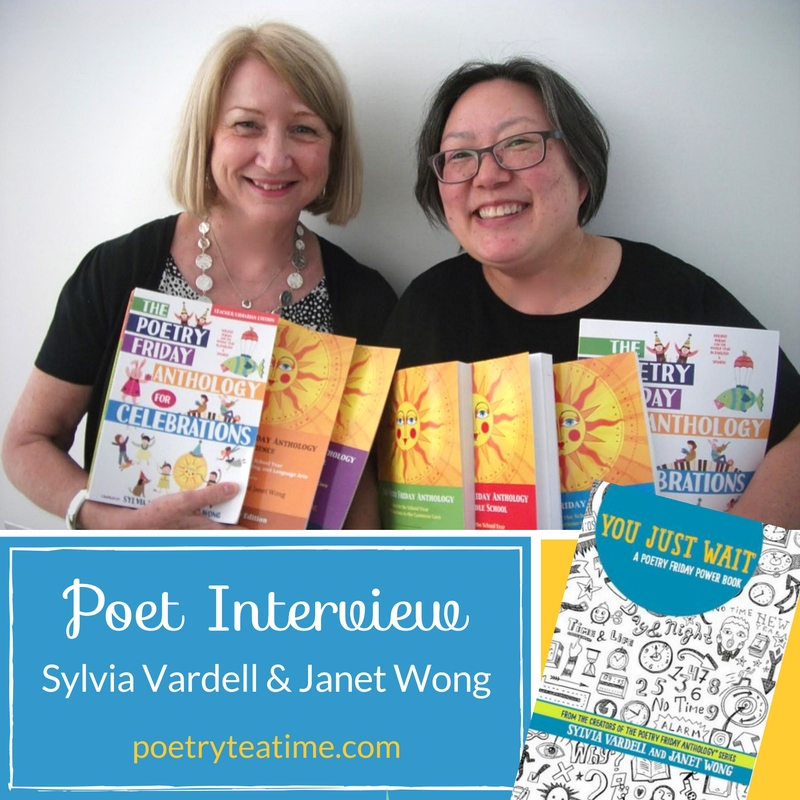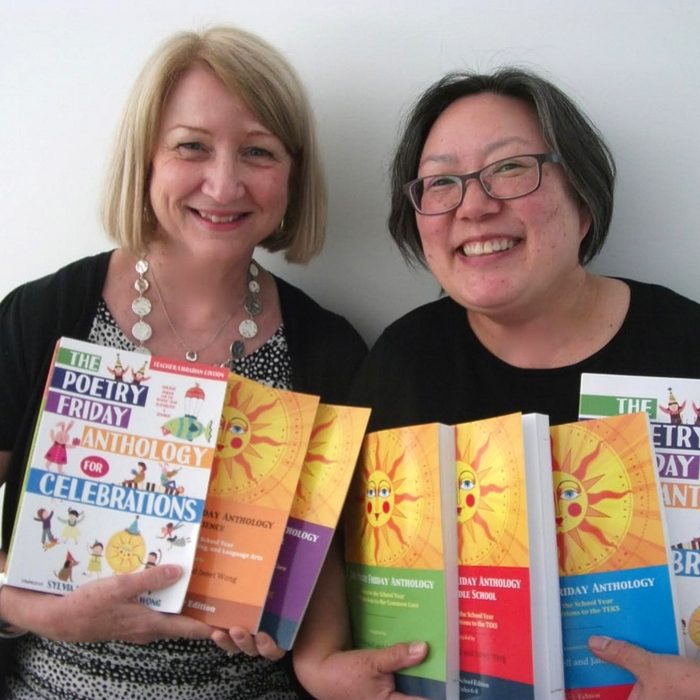What a treat! We were so honored to chat with Dr. Sylvia Vardell and poet Janet Wong. Janet is an award-winning author of picture books and poetry for young readers, and Sylvia is a professor of children’s literature at Texas Woman’s University and author of the acclaimed blog, Poetry For Children. Enjoy their written interviews and audio podcast with Julie Bogart below.
[This post contains affiliate links. Thank you for supporting Poetry Teatime!]

Janet
From subway trains to the White House, your writing has appeared in many unusual places. What do you consider your favorite or greatest success in sharing your work with others?
JW: The greatest success is probably having my work featured on The Oprah Winfrey Show in a “Remembering Your Spirit” segment that focused on my switch from being a lawyer to writing children’s books. I received thousands of emails after that segment aired, including lots of notes from people who said they were finally inspired to follow their dreams to write. I think we all have at least one story (or poem) to share and I love encouraging people to do it. As a second grader in Maryland once told his teacher, “Janet Wong is so EXPIRING!”
Many of your books and poems vividly describe particular foods, from the yummy to the strange. What's your favorite food? How does food tie into your poetry? Do you have any suggestions for some non-traditional poetry teatime treats for our families to try out while reading your poetry?
JW: There are very few foods that I don’t like, but my favorite foods are sushi, dim sum (dumplings), ramen, and wonton noodle soup. For a traditional Asian but non-traditional Western teatime treat: buy frozen dumplings, pop them in the microwave (or boil or fry them), and serve with black tea!
Both of your experiences have dealt with what it means to grow up in a multicultural country and world. What advice do you have for families and students trying to celebrate and belong to many different cultures?
JW: For people learning about other cultures “from the outside”: it’s easy to jump in and sample different cultures in most big cities—and food is a great starting point. If your kids have never been to an Ethiopian restaurant, or a Vietnamese restaurant, or a Korean restaurant, try it this week! Chat with the waiter or waitress; ask questions, and be open to learning new things. Even in rural areas, with the Internet and free shipping by many online stores, it’s easy to sample international snacks.
For people wanting to celebrate their own diverse cultures: language is key. If you speak the languages of your heritage, speak them to your children. And if you don’t speak those languages, or if your children resist, expose them passively to those languages with food, movies, and songs. I learned only a little bit of Chinese and Korean (mainly food words and very basic phrases) when I was a child because the U.S. was very much an “English-only” place in the 1960s, but now it’s easy to borrow foreign DVDs and CDs at the library and being multilingual is considered by most of us as an asset and strength.
Writing is often visualized as an individual work. Is there a strong sense of community among children’s poets? How do you mesh individual writing with community?
JW: I think there is no closer group than the community of children’s poets. There are less than 200 of us—and about 100 of us regularly communicate with each other via social media, email, and gatherings at conferences. As for the best way to mesh my individual poetry aspirations with community: anthologies!
Learn more about Janet Wong on her website and check out her poetry books like, Home Grown House.

Sylvia
You're a blogger who's been active in the online community for many years now. How has blogging helped strengthen your poetry?
SV: OK, I have to come clean. I don’t write poetry. I am the person who creates all the teaching connections for the poetry that Janet writes and curates (by tons of other poets). I like to enjoy the magic of poetry as an outsider! My decade of blogging has helped me learn a ton of info about the poetry community, to read widely and deeply, and to work with poets, publishers, and educators to promote poetry more widely. That has been so rewarding.
How has learning English as a second language affected the way you write or read poetry? How can poetry help students learn English as a second language?
SV: Yes, I think poetry is an ideal vehicle for students who are learning English! The focus and conciseness of poetry helps, the limited word usage helps, the vivid vocabulary helps, the generous white space helps, and when it rhymes, it makes it clear to young children how the words should sound. Just imagine: you’re learning Russian and you hear a rhyming, rhythmic poem and you recognize a handful of words. That helps you guess what the poem might be about—and that’s how linguistic understanding begins—with listening, thinking, and guessing.
The anthologies that you have collected and edited together, the Poetry Friday Anthologies, are named for poetry bloggers who write blog posts every Friday about poetry. How has the world of the Internet changed poetry?
SV: I don’t think the Internet is changing poetry—I think it’s changing US and bringing more poetry to more people. The Web has become a portal to poetry for many children, teachers, and writers who might not have stopped to check out the books on the 811 shelf in the library, but now are encountering poetry incidentally—and are surprised by how much they like it. For us “content creators,” the Internet provides a marvelous avenue for publishing, experimenting, and collaborating and sharing more poetry with more people than ever before.
Visit Sylvia Vardell's website and check out her book, Poetry Aloud Here!

About the Anthologies
What’s been one of the most rewarding parts about collecting this anthology series?
JW: A few conferences ago, we presented to a standing-room only group where most of the teachers in the audience were poetry newbies—and that was really exciting. Our brand-new book You Just Wait: A Poetry Friday Power Book offers a whole new approach to teaching poem-writing to ages 10 and up. Our books in The Poetry Friday Anthology series have 700+ poems selected for their accessibility and teachability; paired with Sylvia’s “Take 5!” mini-lessons for each poem, these anthologies are bringing a lot of new readers to poetry.
What’s the balance between poems that are “preachy” and poems that address an important subject? How did you choose which poems were the best for these anthologies?
JW: The common wisdom is to avoid creating children’s literature that preaches. I used to be very wary of didacticism in my writing when I started out, but now I’m not really worried about that. There are things that we want children to know—in order to help them become better people. Think about the kids you want in your neighborhood. Will it hurt them to hear a 20-second poem on kindness, or writing thank you notes, or washing their hands, or paying compliments? A poem is a great way to teach good citizenship every day in a minute or less!
SV: But let me add that Janet (and other poets) have a real gift for creating poetry that speaks to children through relevant moments, authentic examples, and often a bit of humor. There may be a “message,” but the poem offers more than that too.
What is one lesson that you would like people to take away from this anthology?
JW: Poetry is short; most children’s poems take less than 30 seconds to read aloud. And you can find poems on every subject from breakfast to soccer to friendship to losing a tooth. So it’s easy to make poetry part of your everyday life.
Do you have suggestions for families who would like to incorporate some of the classroom resources found in the anthology into a home setting?
SV: Yes, make it fun! Read poems aloud yourself first and ham it up! Then read them aloud again and invite kids to say the last word or line with you. You can even make a recording on your cell phone to share any time. Make poem sharing a bedtime activity—shorter than a story—and point to the lines as you read them aloud and the kids can chime in, if they want to. Don’t be afraid to share favorite poems over and over again. Those are the literacy nuggets that stay in kids’ hearts and minds for a lifetime!
Thanks for joining us, Sylvia and Janet! We look forward to using the wonderful resources and anthologies you’ve compiled!
LISTEN TO THE PODCAST
The Poetry Friday Books
The Poetry Friday Anthology (K-5 edition): Poems for the School Year
The Poetry Friday Anthology for Middle School (grades 6-8)
The Poetry of Science: The Poetry Friday Anthology for Science for Kids



